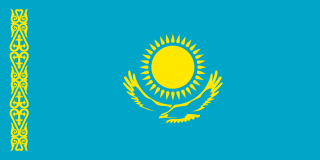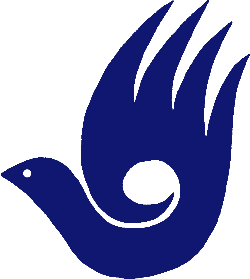
Kazakhstan, officially the Republic of Kazakhstan, is a landlocked country mostly in Central Asia, with a part in Eastern Europe. It borders Russia to the north and west, China to the east, Kyrgyzstan to the southeast, Uzbekistan to the south, and Turkmenistan to the southwest, with a coastline along the Caspian Sea. Its capital is Astana, while the largest city and leading cultural and commercial hub is Almaty. Kazakhstan is the world's ninth-largest country by land area and the largest landlocked country. It has a population of 20 million and one of the lowest population densities in the world, at fewer than 6 people per square kilometre. Ethnic Kazakhs constitute a majority, while ethnic Russians form a significant minority. Officially secular, Kazakhstan is a Muslim-majority country, although ethnic Russians in the country form a sizeable Christian community.

Kazakhstan, the largest country fully within the Eurasian Steppe, has been a historical crossroads and home to numerous different peoples, states and empires throughout history. Throughout history, peoples on the territory of modern Kazakhstan had nomadic lifestyle, which developed and influenced Kazakh culture.
A resistance movement is an organized group of people that tries to resist the government or an occupying power, causing disruption and unrest in civil order and stability. Such a movement may seek to achieve its goals through either the use of violent or nonviolent resistance, or the use of force, whether armed or unarmed. In many cases, as for example in the United States during the American Revolution, or in Norway in the Second World War, a resistance movement may employ both violent and non-violent methods, usually operating under different organizations and acting in different phases or geographical areas within a country.
Regionalism is a political ideology that seeks to increase the political power, influence and self-determination of the people of one or more subnational regions. It focuses on the "development of a political or social system based on one or more" regions, and/or the national, normative, or economic interests of a specific region, group of regions or another subnational entity, gaining strength from or aiming to strengthen the "consciousness of and loyalty to a distinct region with a homogeneous population", similarly to nationalism. More specifically, "regionalism refers to three distinct elements: movements demanding territorial autonomy within unitary states; the organization of the central state on a regional basis for the delivery of its policies including regional development policies; political decentralization and regional autonomy".

The Catholic Church and politics concerns the interplay of Catholicism with religious, and later secular, politics. The Catholic Church's views and teachings have evolved over its history and have at times been significant political influences within nations.

Democratic Choice of Kazakhstan is a political party in Kazakhstan. It was founded by Mukhtar Ablyazov, a businessman and a former minister and Galymzhan Zhakiyanov, who was the akim of Pavlodar Region. The QDT embraced a number of influential politicians and wealthy businessmen of the country who grew disillusioned with the inner circles of President Nazarbayev. The movement adopted a strong anti-Nazarbayev stance and criticized the corruption and nepotism of the president and his clique. The party seeks to peacefully topple the current Kazakh regime and to transform Kazakhstan into a parliamentary republic.
The Jeltoqsan, also spelled Zheltoksan, or December of 1986 were protests that took place in Alma-Ata, Kazakh SSR, in response to CPSU General Secretary Mikhail Gorbachev's dismissal of Dinmukhamed Kunaev, the First Secretary of the Communist Party of Kazakhstan and an ethnic Kazakh, and his replacement with Gennady Kolbin, an ethnic Russian from the Russian SFSR.

The Nationwide Social Democratic Party, sometimes translated as the All-National Social Democratic Party, is a political party in Kazakhstan led by Ashat Raqymjanov. It was founded by a former presidential candidate and the Mazhilis Chairman, Zharmakhan Tuyakbay. The party was registered by the authorities on 25 January 2007, aiming to become a member of the Socialist International (SI) which happened in 2012 as the JSDP became consultative member, and then a full member in 2016.
Rashid Nugmanov is a Kazakh film director, dissident, political activist and founder of the Kazakh New Wave cinema movement.
Left-wing nationalism or leftist nationalism is a form of nationalism which is based upon national self-determination, popular sovereignty, and left-wing political positions such as social equality. Left-wing nationalism can also include anti-imperialism and national liberation movements. Left-wing nationalism often stands in contrast to right-wing politics and right-wing nationalism.
The 2021 census noted that Kazakhstan is 69.31% Muslim, 17.19% Christian, 11.25% other religious beliefs and 2.25% no religious belief.
Uyghurs in Kazakhstan, or Uyghur Kazakhstanis, form the country's fifth-largest ethnic group, according to the 2009 census.

Abish Kekilbayev was a Kazakh National writer and politician who served as a Senator of Kazakhstan from 2002 to 2010, State Secretary of Kazakhstan from 1996 to 2002, and the Supreme Council Chairman from 1994 until its dissolution in 1995.

Snap presidential elections were held in Kazakhstan on 9 June 2019 to elect the President of Kazakhstan following the resignation of long-term President Nursultan Nazarbayev in March 2019. This was the sixth presidential election held since Kazakhstan's independence. The elections were not free and fair, and were widely denounced as a sham. Acting president Kassym-Jomart Tokayev of Nur Otan won the election.
The Jeltoqsan National Democratic Party was an unregistered political party in Kazakhstan. The party was founded on 31 May 1990 by a group of victims of the Jeltoqsan protests that took place in 1986. Its first leader was Hasen Qojahmetov, who was Kazakh nationalist, composer, former political prisoner and the Jeltoqsan protest participant. The main purpose of the party was to free the remaining Jeltoqsan victims from prison, form an independent Kazakhstan, and create a multi-party parliamentary system in the country.
The Azat Civil Movement of Kazakhstan is an unregistered political party in Kazakhstan. It was founded on 30 June–1 July 1990 and is currently being led by Kazakh composer, political activist Hasen Qojahmetov. It was periodically merged into Azat Republican Party of Kazakhstan from 11 October 1992 to 20 November 1992 in an attempt for reunification with the party which was split on 5 September 1991 due to a disagreement in assessing the political and economic course of the country's leadership.
The People's Congress of Kazakhstan was a political party in Kazakhstan. It was founded on 5 October 1991 and became registered on 31 December 1991. It was founded by Olzhas Suleimenov who led the party from 1991 to 1995.
The Kazakh democracy movement is a series of political movements in Kazakhstan that are supported by opposition groups and civil activists which are seeking for reforms in Kazakhstan's current political system, formed from 1991 after the country gained its independence from the Soviet Union and became a sovereign state by advocating for a democratic, multi-party, parliamentary system.

A constitutional referendum in Kazakhstan, locally called the Republican referendum, was held on 5 June 2022. It was the third referendum since Kazakhstan's independence in 1991, and the first since the 1995 referendum that established the current constitution. The amendments followed violent civil unrest in early January caused by worsening economic conditions and subsequent calls for rapid political reform. The referendum changed 33 of the document's 98 articles. Political commentators assessed that amendments would lessen the influence of the executive branch, grant more powers to the Parliament, and eliminate the powers that former president Nursultan Nazarbayev had retained after resigning from office in 2019.








